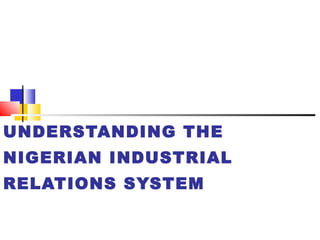
Industrial Relations System And Emerging Issues In the - Copy (2)
- 2. Industrial Relations Industrial Relations is concerned with: the sociology and politics of power in work situations attempts to find solutions to the various problems pose by the determination of wages, hours of work, conditions of service, e t c. These problems are ever present in the day to day running of organizations.
- 3. Cont’ Industrial system consist of three actors: Employers[ who provide the capital for setting up the company and meeting other obligations in the industry] and/or their associations Employees/workers and their organizations – supply their physical, mental and other innate abilities in exchange for wages and other perquisites Government - provides the rules and regulations for the proper conducts of the system and the actors.
- 4. Cont’ Allan Flanders, defined industrial relations as a system of rules and job regulations, both procedural and substantive. According to him, these rules establish “rights and obligations, which together defines status”. Yesufu{1958} defined industrial relations as “the whole web of human interactions at work which is predicated upon and arises out of the employment contract”. These interactions involve :
- 5. Cont’ Employment problems and employment security Conditions of work, hours of work, shifts, holiday, e t c. Remuneration; level, frequency, methods of wage payments and wage fixing labour and employer grievances and disputes Level of production and efficiency Safety, health and welfare at work Social security provisions Employee development; training, upgrading and promotion.
- 6. Cont’ From these definitions, the scope of industrial relations can be summarized as follows: ---relationshipbetweenindividuals i.e. workers and managers ---collectiverelationshipi.e. betweengroupof workers andindividualsupervisor --- relationshipbetweengroups of employees and managers indifferent organizations ---relationshipbetweenagroupof employees inadistinct organization THE PERSPECTIVES OF INDUSTRIAL RELATIONS
- 7. The Unitary Perspective It is one of the earliest approaches to explaining the employment relationship. Here, I R is seen as abnormal and the work of agitators and traitors. In this frame of reference, enterprise corporatism and high level of paternalism are very prevalent as every effort is geared towards de- emphasizing the union through the provision of generous welfare benefits and remuneration packages for workers.
- 8. The Pluralist perspective This perspective recognizes the inherent differences in interests and values of the various components of the organization. Conflict in labour management relations is therefore perceived as natural and inherent as the objectives of each of the actors are not always the same. The pluralist school consequently advocates for institutions such as trade unions and collective bargaining as machineries for the constructive resolution of conflict in industry
- 9. The Marxist Perspective This school believes that the “agonizing and traumatic experience of the labouring class could be ameliorated and improvements in their working conditions achieved only through the antagonizing role of trade unions, while the ultimate goal would be the displacement or overthrow of the capitalist mode of production and the subsequent installation of the proletariat leadership. In other words, Marxists see trade unions as revolutionary agents for changing the social order.
- 10. Elements of a Sound Industrial Relations System Freedom of Association Tripartism in labour policy formulation Collective bargaining Social dialogue Dispute settlement Sound HR policies at enterprise level
- 11. Challenges before the key Actors For effective negotiation ,the main challenge facing the social partners in industry is to understand the objectives and the interests of the parties . It is this understanding that can bring about consensus during negotiation .
- 12. Trade Unions’ objectives Provision of economic benefits for members The union is a platform for social interaction among its members Political benefits- through the power of collectivity, union is seen as a formidable pressure group to enhance workers bargaining power The union provides a forum whereby the members could satisfy their psychological needs To meet the job security need of members The objective of providing other welfare
- 13. Employers’ objectives Classical and Marxist theories of production in market economics describe the employer objectives as the maximization of production through subordination of employees to long hours of work at minimum costs. Empirically however, experience tends to show that employers and their representatives do not declare this as their IR objectives.
- 14. EMPLOYERS’ OBJECTIVES An average modern organization in Nigeria today would declare that “ the overall company policy is to recruit, motivate, train, retrain employees of high calibre who can make effective contribution to the overall profit of the company”.
- 15. Cont’ from the above, one thing is clear, that is the profit motive of the employer. To keep employees for improved productivity at a reduced cost. Other objectives include: ---to compete effectively in today’s world of business. ---to be morally responsible to the society